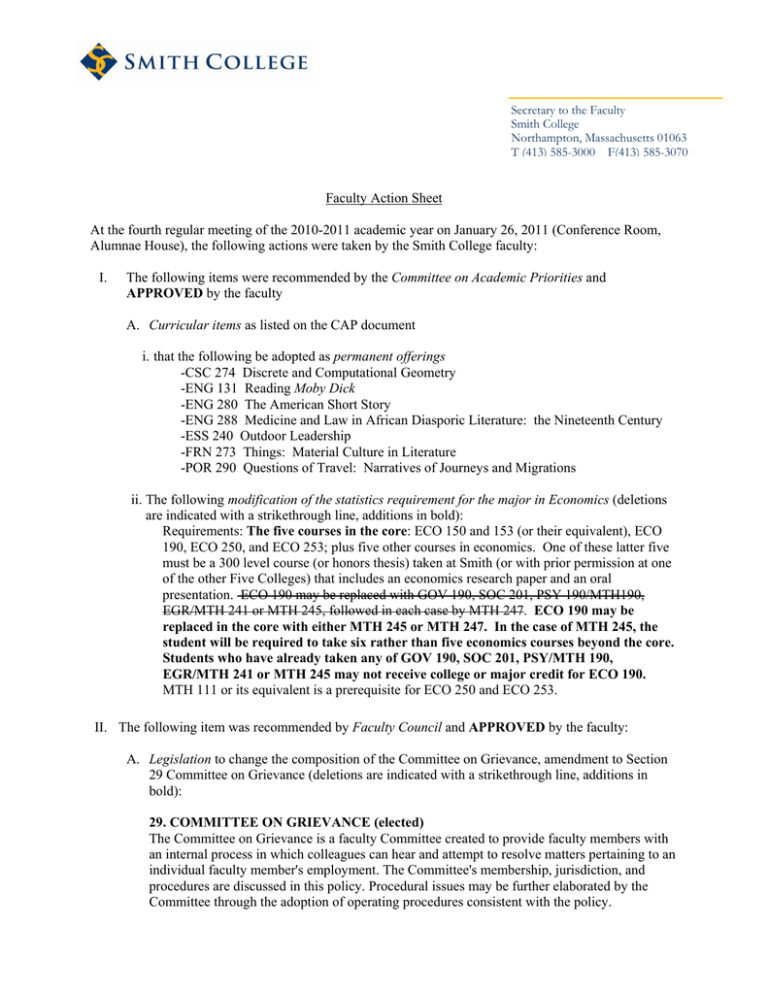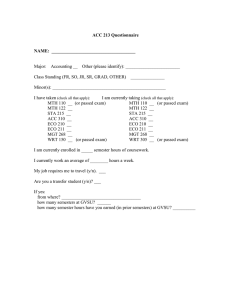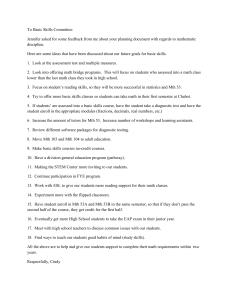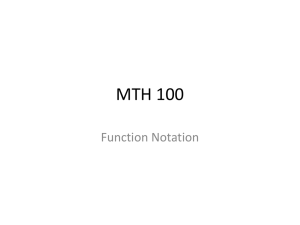Document 12929944
advertisement

Secretary to the Faculty Smith College Northampton, Massachusetts 01063 T (413) 585-3000 F(413) 585-3070 Faculty Action Sheet At the fourth regular meeting of the 2010-2011 academic year on January 26, 2011 (Conference Room, Alumnae House), the following actions were taken by the Smith College faculty: I. The following items were recommended by the Committee on Academic Priorities and APPROVED by the faculty A. Curricular items as listed on the CAP document i. that the following be adopted as permanent offerings -CSC 274 Discrete and Computational Geometry -ENG 131 Reading Moby Dick -ENG 280 The American Short Story -ENG 288 Medicine and Law in African Diasporic Literature: the Nineteenth Century -ESS 240 Outdoor Leadership -FRN 273 Things: Material Culture in Literature -POR 290 Questions of Travel: Narratives of Journeys and Migrations ii. The following modification of the statistics requirement for the major in Economics (deletions are indicated with a strikethrough line, additions in bold): Requirements: The five courses in the core: ECO 150 and 153 (or their equivalent), ECO 190, ECO 250, and ECO 253; plus five other courses in economics. One of these latter five must be a 300 level course (or honors thesis) taken at Smith (or with prior permission at one of the other Five Colleges) that includes an economics research paper and an oral presentation. ECO 190 may be replaced with GOV 190, SOC 201, PSY 190/MTH190, EGR/MTH 241 or MTH 245, followed in each case by MTH 247. ECO 190 may be replaced in the core with either MTH 245 or MTH 247. In the case of MTH 245, the student will be required to take six rather than five economics courses beyond the core. Students who have already taken any of GOV 190, SOC 201, PSY/MTH 190, EGR/MTH 241 or MTH 245 may not receive college or major credit for ECO 190. MTH 111 or its equivalent is a prerequisite for ECO 250 and ECO 253. II. The following item was recommended by Faculty Council and APPROVED by the faculty: A. Legislation to change the composition of the Committee on Grievance, amendment to Section 29 Committee on Grievance (deletions are indicated with a strikethrough line, additions in bold): 29. COMMITTEE ON GRIEVANCE (elected) The Committee on Grievance is a faculty Committee created to provide faculty members with an internal process in which colleagues can hear and attempt to resolve matters pertaining to an individual faculty member's employment. The Committee's membership, jurisdiction, and procedures are discussed in this policy. Procedural issues may be further elaborated by the Committee through the adoption of operating procedures consistent with the policy. (a) Membership 1. The Committee on Grievance shall consist of five members of the faculty, of whom two shall be from the permanent staff and three from either the permanent or temporary staff, two from the temporary staff, and one a member-at-large who may be from either the permanent or the temporary staff. 2. One member of the faculty from the permanent staff and one from the temporary staff Three additional members of the faculty from either the permanent or temporary staff shall stand in reserve for service on the Committee if one or more of the regular members be disqualified for consideration of a case by a conflict of interest. When the services of a faculty member standing in reserve are required, the choice of which faculty member is to serve shall be such as to maintain membership as outlined as outlined in section 29 (a) (1) the number of temporary staff and the number of permanent staff on the Committee whenever possible. At the beginning of each case, the question of whether a conflict of interest exists for a member of the Committee shall be decided, and the choice of the alternate member shall be made by the regular members of the Committee on Grievance, the member(s) in question abstaining. 3. A member of the Committee has a conflict of interest if: (i) The member is a member of the department or program of the petitioner; (ii) The member has herself or himself previously voted in any capacity in the case being brought to the Committee; or (iii) The member is a current or former family member of the petitioner. 4. No currently serving members of the administration or of the Committee on Tenure and Promotion shall be eligible for election to or service on the Committee on Grievance. 5. Each year the members shall elect one of their number as Chair. (b) Terms of office, nomination and election 1. Members of the Committee shall be elected for staggered terms of three years so that one of the permanent staff members and one of the temporary staff members be elected in one year, the member-at-large be elected in the next year, and one of the permanent staff members and one of the temporary staff members be elected in the following year. 2. A member of the Committee shall not be eligible for re-election until after a period of time equal to that individual's term of office on the Committee. 3. The classification of a member of the faculty as a member of the temporary staff or as a member of the permanent staff shall be determined by the status of the individual at the time of nominations for election to the Committee. If a member of the temporary staff is made a member of the permanent staff during his or her term of office, the member continues to serve on the Committee as one of the temporary-staff members until his or her term expires. 4. (RENUMBER TO 3) Nominations and elections shall be made in accordance with the provisions in sections 47 of the Faculty Code. The members of the Committee shall nominate as many two candidates from the faculty as necessary so as to maintain membership as outlined in sections 29 (a) (1), (2) and b (5) permanent staff for each Page 2 of 3 opening in that category and two candidates from the temporary staff for each opening in that category, and, for elections in which the position of member-at-large is to be filled, one additional candidate each from the permanent and temporary staff. The ballot shall list all candidates, those nominated by the Committee and those nominated by the faculty-atlarge, in two groups: members of the permanent staff and members of the temporary staff. All voting members of the faculty will vote preferentially within each group. In elections in which the position of member-at-large is to be filled, the member-at-large shall be that candidate from the entire slate of nominees who is elected with the largest number of ballots. 5. (RENUMBER TO 4) It is recommended that nominees be selected so as to provide representation of each Division on the Committee. 6. (RENUMBER TO 5) The two three members of the faculty, one each from the permanent and temporary staffs, who are next in line for election to the Committee (after the election of the regular members) shall stand in reserve for service in cases of conflict of interest, as provided in section 29 (a) (3). Respectfully submitted, Jeffry Ramsey Secretary of the Faculty Page 3 of 3


